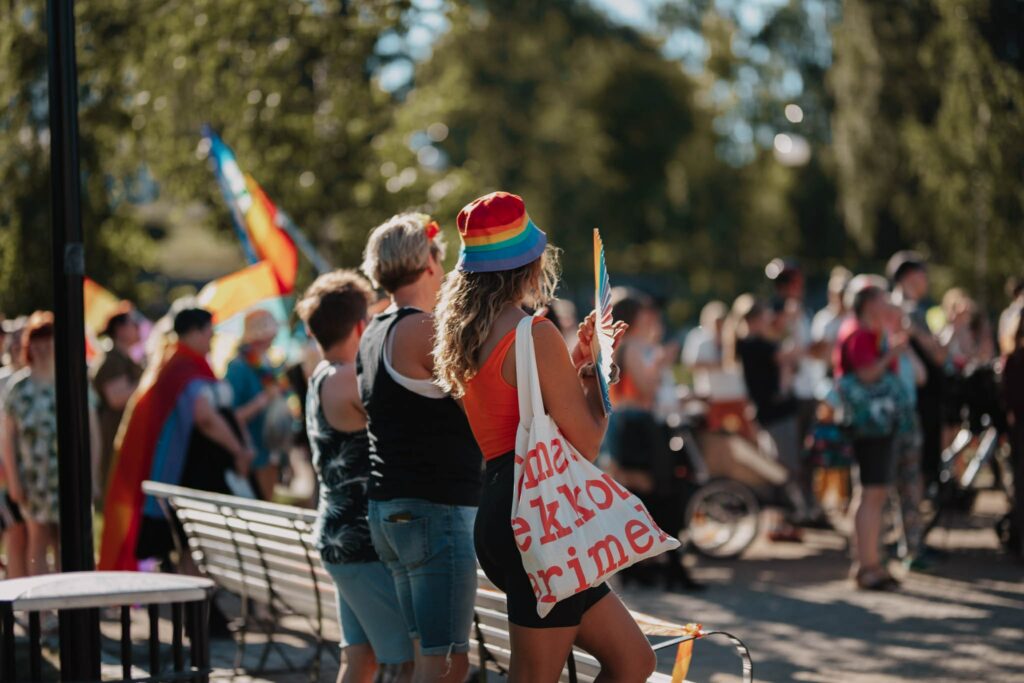Responsibility

Accessibility and environmental responsibility in event organisation
The sustainability of an event means taking care of the accessibility and environmental responsibility of the event in a manner that makes organising events possible in the future as well. The City of Kuopio supports sustainability in event organisation and wants to make the creation of sustainable events as easy as possible. On this page, we have compiled information you can utilise in organising an event.
The event organiser bears the operative and financial responsibility for the event. In practice, the event has one organiser who may have several contracting partners. The event organiser has the highest power of decision.
What is accessibility?
Taking accessibility into consideration when organising an event makes the event more appealing. It also ensures that as many people as possible will be able to participate in or work at the event. Accessibility applies to mobility, services, and communication.
The event organiser is legally obliged to ensure the accessibility of the event. The Non-Discrimination Act prohibits discrimination on the basis of disability and obliges the service provider to make reasonable adjustments for persons with disabilities. In addition, accessibility improves the comfort and safety of the event and increases its credibility and attractiveness among visitors. Accessibility is best achieved when it is taken into consideration in all stages of the planning and organisation of the event.
General information
- The event venues should be accessible to everyone.
Personal assistants, interpreters, and support persons
- Persons with disabilities may attend events with their personal assistant, interpreter, or support person.
- The ticket for a personal assistant, interpreter, or support person is free of charge.
- It should be noted that at the moment, with the exception of visually impaired persons, there is no universal card to prove disability. Similarly, it is not possible to prove the need for a personal assistant, and the need for a personal assistant may not be apparent. Event organisers should simply trust the person’s own announcement of their need for an assistant.
Acquisition of tickets
- Personal assistants must be able to book a seat near the person in need of assistance.
- The seats for wheelchair users are available for purchase from the online store.
Prior information and moving at the venue
- The prior information and the location of the event must be carefully considered. For example, the locations of the accessible entrances, restaurants, toilets and the information desk must be mentioned in the event description.
- The base map of the venue must show seats and other places that are accessible by wheelchair. The seat information of the ticket should correspond to the information given on the venue map.
- Assistance must be offered as needed in entering the venue and moving in the venue.
- Festivals must also provide accessible toilets.
- Free movement from a wheelchair seat to the toilets or restaurant services must be ensured.
Environmental responsibility
Any possible environmental impact of an event should be taken into consideration from the early stages of the organisation so that any environmental problems can be solved in time. The environmental impact of an event consists of waste, traffic, sound pollution and services and procurements. Their impact must be carefully considered, as it is integral to the comfort and convenience of the event. Furthermore, ensuring environmental responsibility improves the image of the event.
Please take into consideration the following while organising an event:
-
Please ensure that there are easily accessible sorting points for waste and that they are emptied frequently. Clearly mark areas designated for smoking and ensure that ashtrays are provided.
-
It is important to encourage visitors to arrive at the event venue by foot, bicycle, or public transport. Ensure that there are accessible parking areas for bicycles.
-
Use renewable energy and energy-sufficient equipment at the event. Turn off any unnecessary electrical appliances.
-
Favour locally produced, ecological food and minimise food waste. Favour reusable or biodegradable cutlery and ensure that visitors are provided with the opportunity to fill their own water bottles.
-
Avoid distributing extra items or merchandise. Provide information and schedules of the event electronically instead of printed leaflets. Use reusable and recycled materials.
-
Ensure that no contaminants are discharged into the watercourses. Direct waste water to a sewer or a sealed tank, and deliver the waste water to a sewage plant.